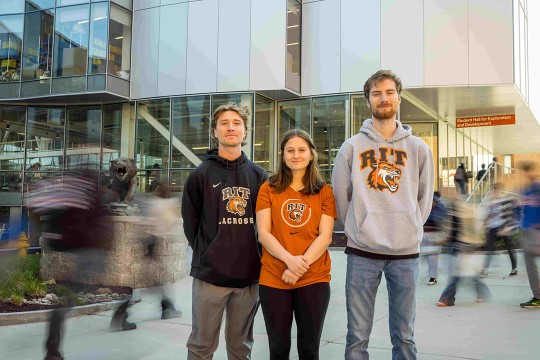RIT Prepares Master’s Degree Program in Computer Security and Information Assurance
Unique cross-disciplinary curriculum to be introduced next fall
Underdeveloped and non-existent computer security measures are having a dramatically negative impact on our society’s economic infrastructure. In response to this emerging technological area, Rochester Institute of Technology is preparing a new master’s degree program in computing security and information assurance.
The program, to be offered through RIT’s B. Thomas Golisano College of Computing and Information Sciences (GCCIS), consists of a half dozen core courses dealing with technical, business, ethical and administrative aspects of security. Additionally, areas such as risk management and the cost of security will be analyzed.
While similar programs in computer security already exist at a handful of other universities, the RIT program will differ by focusing on the complete spectrum of computing.
“Our program is unique in that it will be offered at the college level and utilize faculty from the computer science, software engineering and information technology departments,” explains Jorge Díaz-Herrera, GCCIS dean. “The cross-disciplinary nature of the program will qualify graduates for a wide range of computer security related careers in both the private and public sectors.”
To better hone the curriculum, three members of the GCCIS faculty recently took part in a month-long training session. Hans-Peter Bischof, associate professor of computer science; Stephanie Ludi, assistant professor of software engineering; and Luther Troell, associate professor of information technology, traveled to Carnegie Mellon University to present RIT’s plan to a diverse group of experts. The resulting exchange of ideas offered some useful feedback.
“Initially, our curriculum lacked certain non-technical aspects,” says Bischof. “As a result of that input, we’ve added elements relating to policy writing, international law, and management and leadership.”
To help round out the program, RIT’s College of Liberal Arts is developing a class in security law, ethics and policy. The class, which will be incorporated into the core curriculum, will examine ethical issues related to computing security and offer a general understanding of related laws established at both municipal and international levels.
According to Roger Gaborski, GCCIS associate dean and director of the Laboratory for Applied Computing, protecting intellectual and personal information is a challenge for both government and industry. Since the attacks themselves cannot be prevented, critical systems must be designed to survive the attacks.
“It is now recognized that there is a need for computing security experts who can identify and avert potential problems,” states Gaborski.
The computing security master’s degree program is expecting to begin next fall. Initially, about 25 students per year will be accepted, but the program will likely grow to a maximum of 50 students annually.
NOTE: RIT’s B. Thomas Golisano College of Computing and Information Sciences is the largest comprehensive computing college in the nation, offering undergraduate and graduate programs in computer science and information technology and an undergraduate program in software engineering. The college is home to the Laboratory for Applied Computing, which partners with industry in the development of innovative applications of emerging information technologies.
Founded in 1829, RIT is internationally recognized as a leader in computing, engineering, imaging, technology, fine and applied arts, and education for the deaf. RIT enrolls 15,500 students in more than 340 undergraduate and graduate programs.














